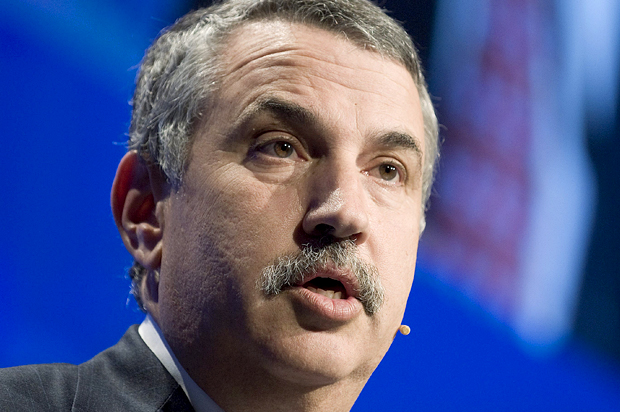Like people in any other industry — but probably to an extent that’s greater than most, for obvious reasons — a thick amalgam of backbiting and gossip is part of what binds journalists together. Unlike most other industries, however, journalism allows its practitioners to collect as much backbiting and gossip as they can, ask those being backbit and gossiped-about to respond, throw it all together and expect it to be received as a serious, professional piece of work. Sometimes the approach is justifiable; other times, it is not.
But as I read the latest from Thomas Friedman — a cry for the world’s Muslims to engage in “a million-person march against the jihadists” — I became more convinced than ever that one of last year’s most-talked-about examples of the genre, the New York Observer’s exposé of behind-the-scenes dissension at the New York Times, was not only defensible but downright necessary. Why? Because of all the quotes from Times staffers slamming the three-time Pulitzer Prize winner as a self-satisfied “brand” who is “on cruise control” and who is, well, “an embarrassment.” In retrospect, they may have been putting it lightly.
Truth be told, if there’s anything that really distinguishes Friedman’s contribution to the growing “million Muslim march” meme (a close cousin of the “Where’s the Palestinian Mandela?” talking point that pops up whenever Israel attacks Gaza), it is its consummate intellectual sloppiness. Using the frivolous nontroversy over President Obama’s no-show at last week’s huge march in Paris for free speech and against radical Islam as a jump-off, Friedman writes that we should focus instead on “what would have really made the world feel the jihadist threat was finally being seriously confronted,” which is apparently a massive march from Arab-Muslims that, Friedman writes (with unintentional irony), would be organized “without anyone in the West asking for it.”
In fairness, not everything in the column is quite this slipshod. When Friedman tries to preemptively fend off accusations of Orientalism by using the journalist Abdul Rahman al-Rashed as a rhetorical shield, for example, it’s tacky but not unreasonable. Al-Rashed does indeed argue that because jihadists are premising their slaughter on established — which is not the same as mainstream — interpretations of Islam, it’s up to the Muslim community writ large to make clear that it abhors the murder of innocents. And when Friedman offers a truncated review of how Saudi Arabia’s embrace and dissemination of an ultra-conservative version of Islam that is, as he puts it, “a very short step from … the violent jihadism practiced by the Islamic State,” he’s on firm footing. (Friedman’s best work came during his time as a reporter in the Middle East, and while his interpretations are often eminently debatable, it’s clear that he knows his stuff.)
So it’s not exactly Friedman’s self-negating promotion of an Arab-Muslim-organized march that’s annoying, but rather the double standard that hovers, unrecognized, along its edges. If he wants to make the defensible argument that the “ambivalence” about Islamic radicalism that permeates the Arab-Muslim world shows that the links between moderate Islam and jihadism are strong enough to require the former to publicly rebuke the latter, that’s fine. But that’s a sword that can be turned just as easily against the West — and especially against the United States. If the guilt-by-association standard is meager enough that the actions of al Qaeda can be laid at the feet of Islam itself (rather than history or politics), then surely some of the most morally indefensible elements of U.S. foreign policy can also be ascribed to something inherent in the American mythos?
Obviously, it would be impossible for this column to even begin to untangle the relationship between Americanness and the U.S.’s embrace of preemptive invasion, torture and drone strikes. (No more impossible than doing the same with a belief system as old, complicated and multifaceted as Islam, but whatever.) But I think it’s more than fair to note that the U.S.’s postwar acceptance of the absurdly ill-defined concept of “national security” has quite a lot to do with Americans’ willingness to defend systematic torture, or their complete lack of interest in reining in a drone-strike policy that is brazen in its lawlessness and minimalist in its concern for the lives of innocents. And while I’ve no doubt that many Americans would blanche at the idea that the U.S.’s self-conception as the “last best hope” of humanity has often led it to embrace violent preemption, the historical record is not so squeamish.
My point isn’t to say the United States is as bad or worse than the purveyors of radical Islam. I don’t think that’s true — and, in any event, it’s a dumb game in which no one ever really wins. My point, instead, is to note that calls from Friedman and others for the world’s Muslims (who number in the hundreds of millions) to organize a grand, symbolic display to prove they condemn murder are not only glib and irrelevant to actually thwarting radical Islam, but hypocritical, too. If Tom “suck on this” Friedman wants to prove he’s opposed to torturing innocent people to death, bombing a wedding or launching a war of choice, more power to him. But if he wants the world to believe he means it, he’ll have to organize it himself.

